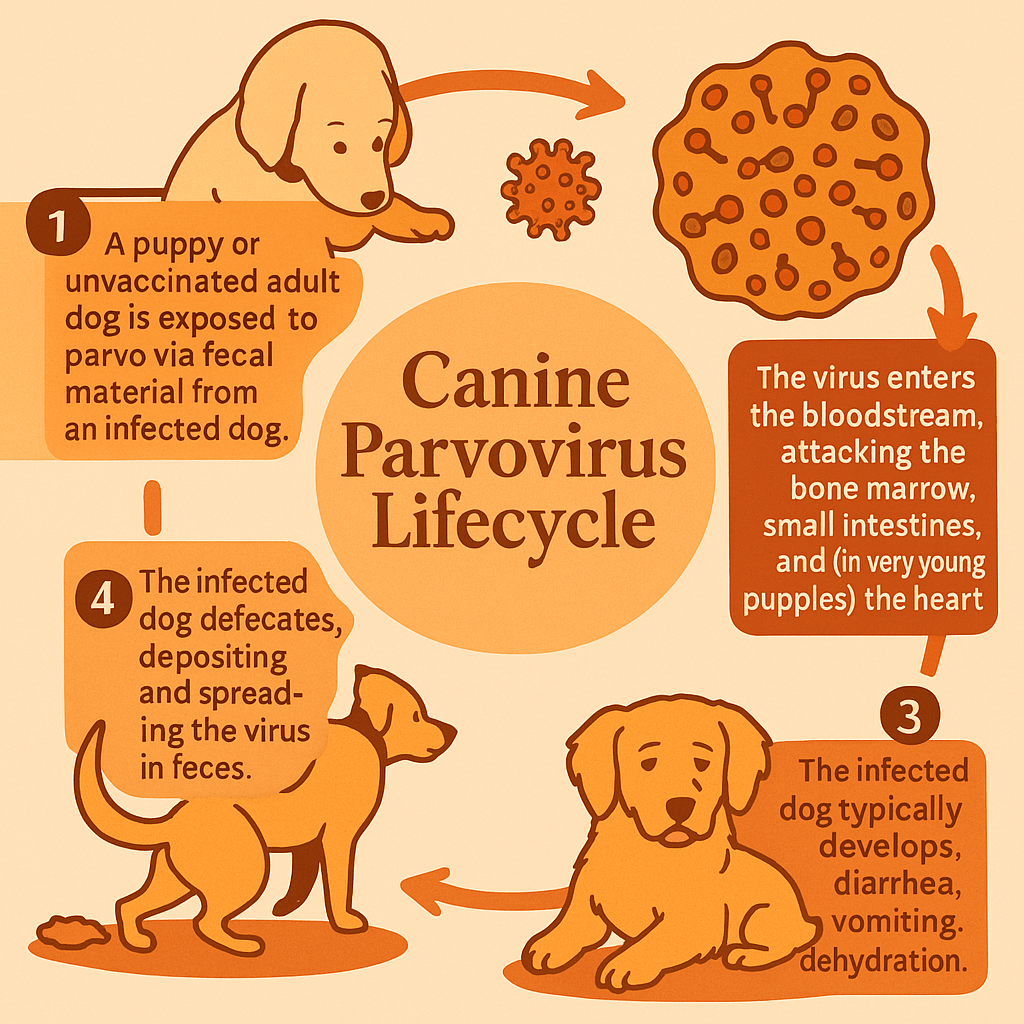Parvovirus—say the word out loud and chills run down the spine of any dog parent. It's perhaps the most infectious and deadly dog disease, with a particular special spot in puppy hearts. Fear not, however! With rapid detection, immediate action, and a bit of love, most canines recover from it.
We'll take you through all that you need to know about parvo—everything from symptoms to recovery—and what you can do to keep your best friend safe.
What Is Parvo in Dogs and Puppies?
Parvovirus (CPV) or "parvo" is a highly contagious virus that infects the gastrointestinal system of dogs. It's particularly threatening for puppies under 6 months of age, unvaccinated animals, and dogs with compromised immune systems.
Parvo is very contagious and can be fatal if left untreated. The virus targets quickly dividing cells—like those in the intestines—leading to severe illness.
What Are the Signs of Canine Parvovirus?
Early detection can save lives. Be on the lookout for these warning signs:
- Lethargy or lack of energy
- Loss of appetite
- Sudden or severe diarrhea (usually bloody)
- Vomiting
- Fever or low body temperature
- Dehydration
- Sad or weak behavior
These symptoms typically develop in 3–7 days after exposure. If you see any of these, call your vet right away!⚕️
Parvo Symptoms in Dogs and Puppies
Here's a handy checklist of symptoms to look out for:
- ✔️ Lethargy
- ✔️ Vomiting (frequent, often severe)
- ✔️ Diarrhea (has a bad odor, can be blood-tinged)
- ✔️ Fever
- ✔️ Weight loss
- ✔️ Abdominal pain or swelling
- ✔️ Depression
- ✔️ Dehydration (sunken eyes, dry mouth)
Don't wait until "all" of the symptoms set in—early treatment is the best!
How Do Puppies and Dogs Get Parvo?
Parvo is very contagious. It transmits through:
- Contact with contaminated or infected feces or surfaces
- Licking, sniffing, or ingestion of infected objects
- Virus on human shoes, clothes, or hands
- Contaminated food/water bowls or bedding
The virus will last months in the environment—even heat and cold! That's why vaccination is so crucial. 🛡️
Stages of Parvo in Dogs and Puppies
Here's what the parvo timeline might look like:
- Incubation Period (2–5 days)
The dog is infected but isn't showing symptoms yet. 🐾 - Early Symptoms (Day 3–7)
Mild symptoms such as fatigue and loss of appetite begin. 🤒 - Day 4–10: Acute Illness
Vomiting, diarrhea, and severe dehydration strike. This is the most intense part. ⚠️ - Either Worsening or Recovery (Day 7+ or later)
Dogs recover with treatment. Without it, the virus will kill them.
How Parvo Can Be Treated in Dogs and Puppies
No direct cure, sadly—but it CAN be treated!
Care includes:
- IV fluids to stop dehydration
- Anti-nausea meds
- Antibiotics to prevent secondary infections
- Nutritional support
- Hospitalization (in most cases)
Your dog will need round-the-clock monitoring, especially in severe cases.
Recovery and Management of Parvo in Dogs and Puppies
If caught early, recovery is absolutely possible! Here's what to expect:
- Rest: Your dog will be weak—let them sleep and heal.
- Diet: Begin with plain food such as boiled chicken and rice (as advised by your vet).
- Hygiene: Maintain your home disinfected to avoid reinfection.
- Follow-up: Frequent vet check-ins to track progress.
Complete recovery will take 2–3 weeks, but some pups recover more quickly. 💪
🤲 Can I Touch My Puppy With Parvo?
Yes—but with extreme caution.
- Always wear gloves and disinfect after handling your dog.
- Limit contact with other animals (parvo is very contagious!).
- Wash your hands, clothes, and anything your puppy touches.
- Clean with bleach-based disinfectants—parvo is tough to kill.
And remember, YOU can carry the virus without being infected. Take hygiene seriously!
🌈 Final Thoughts: Hope and Healing Are Possible
Parvo may be scary—but it's not a death sentence. With quick vet care, love, and plenty of patience, your furry pal has a good chance at complete recovery.
🩺 Quick Reminders
- ➕ If your pup is acting sick, don't wait – see your vet today!
- ➕ Early detection saves lives!
- ➕ Prevention is the best shot!
Questions or a parvo recovery tale to tell? Drop them in the comments or shoot us a message—SniffNTail's here for each pawstep along the way! 🐾✨

About SniffnTail
SniffnTail is your go-to destination for everything pets. From helpful advice, tips, and insights to thoughtfully selected products and resources, we’re here to support pet owners at every stage of their journey. Whether you're caring for a playful pup, a wise old cat, or anything in between, SniffnTail offers tools and knowledge to make pet parenting easier and more joyful.
Related Articles
 Health & Wellness • 8 min read
Health & Wellness • 8 min readCavalier King Charles Spaniel Neurological Pain and Anxiety: Signs, Support & Solutions
Explore how CM/SM-related behavioral changes and pain-induced fear affect Cavalier King Charles Spaniels. Learn to recognize signs of neurological pain and support your dog with expert tips.
 Health & Wellness • 7 min read
Health & Wellness • 7 min read5 Common Dental Problems in Dogs: Signs, Prevention & Treatment
Discover the most common dental problems in dogs, their signs, prevention tips, and treatment options. Learn how to brush your dog’s teeth and choose the best dental treats to keep their smile healthy.
 Health & Wellness • 5 mins Read
Health & Wellness • 5 mins ReadUnderstanding Canine Distemper: Symptoms, Transmission, and Prevention
Learn about canine distemper, a deadly viral disease affecting dogs. Discover its symptoms, how it spreads, treatment options, and why vaccination is crucial.

